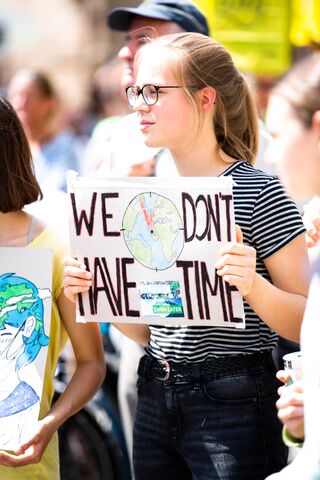Environment
I'm Voting for 2040 in This Election. Are You?
Picture the world in 2040. Did you include the climate crisis in your image?
Posted October 29, 2020
My dad loved elections. He voted every chance he got and when asked whom he voted for, he’d get a gleam in his eye. Pause. And then answer “The Winner!” When I’m asked whom I’m voting for this year, I have a different answer: "2040." No, that’s not a typo. I’m thinking about how my choice will shape what we do over the next 20 years in response to our biggest challenge: the climate crisis.
Which Issues Are Most Important?
To be sure, voters are thinking about other pressing issues right now. A recent Pew Research poll indicated that the economy is the issue most voters (79%) rated as very important for their presidential vote, followed by health care (68%), the recent Supreme Court appointment (64%), and the coronavirus outbreak (62%). Only 42% of voters listed climate change as very important. We have a lot on our plates.

Got Climate Anxiety? You’re Not Alone
But Americans are also worried about climate change. Recent data from the Yale Program on Climate Change Communication reveal that 72% of Americans know that global warming is happening, with a majority understanding that it is human-caused. Sixty-three percent say they are worried about global warming and 61% say global warming will harm people in the United States.
Overcoming the Psychological Barriers
So why don’t more voters rank climate change as very important? Because we are psychologically distancing ourselves from this major threat. Seventy-one percent of Americans say that global warming will harm future generations and a majority (56%) acknowledge that it is already harming people in the United States. But only 43% report that global warming will harm them personally: it will happen somewhere else or in the future, but not for me.
Picturing the future—perhaps a future you won’t see—is also difficult psychological work. Psychologists discuss the processes of thinking across space, time, and perspectives under the title of construal-level theory (Trope & Liberman, 2010). These processes require abstract thinking, “transcending the here and now” focus on yourself and your own circumstances.
Now Is the Time
But now is the time to think and act on the climate crisis. Even as early voting occurs, we are seeing climate change’s impacts: blackouts in California to reduce the threat of more wildfires; farmers in the Midwest trying to recover from floods and extreme weather events; the third hurricane this year heading toward Louisiana; and farmers in Pennsylvania and elsewhere coping with drought conditions.

Of course, this election is not just about these short-term challenges. Instead, we are making decisions that will affect our country’s future and the world’s response to the climate crisis. Elizabeth Kolbert recently summed up what is at stake over the next two decades: “the future—and not just of the next several decades but of the next several millennia—hinges on actions that will be taken by the time today’s toddlers reach adulthood.”
The rationale for Kolbert’s stark assessment is clear. The fourth national climate assessment is the most recent national report to Congress and the president, integrating the work of more than 300 scientists on the effects of global climate change and trends for the next 25-100 years. The assessment concludes that “the evidence of human-caused climate change is overwhelming and continues to strengthen, that the impacts of climate change are intensifying across the country, and that climate-related threats to Americans’ physical, social, and economic well-being are rising. These impacts are projected to intensify—but how much they intensify will depend on actions taken to reduce global greenhouse gas emissions and to adapt to the risks from climate change now and in the coming decade.”
So this year. when I’m asked whom I’m voting for, I have a clear answer: “2040.” I am voting to make sure that we follow the science and assure a sustainable future for my children and grandchildren.
I’m voting for 2040 in this election. Are you?
References
Kolbert, E. (2020). Three scenarios for the future of climate change. The New Yorker, Oct. 5. Accessed at https://www.newyorker.com/news/annals-of-a-warming-planet/three-scenari…
Marlon, J., Howe, P., Mildenberger, M., Leiserowitz, A., Wang, X. (2020). Yale Climate Opinion Maps 2020. Accessed at https://climatecommunication.yale.edu/visualizations-data/ycom-us/
Pew Research Center, August, 2020, “Election 2020: Voters Are Highly Engaged, but Nearly Half Expect To Have Difficulties Voting” Accessed at https://www.pewresearch.org/politics/2020/08/13/important-issues-in-the…
Trope, Y., & Liberman, N. (2010). Construal-level theory of psychological distance. Psychol Rev. 117(2), 440-463. doi: 10.1037/a0018963.
USGCRP, (2018) Impacts, Risks, and Adaptation in the United States: Fourth National Climate Assessment, Volume II [Reidmiller, D.R., C.W. Avery, D.R. Easterling, K.E. Kunkel, K.L.M. Lewis, T.K. Maycock, and B.C. Stewart (eds.)]. U.S. Global Change Research Program, Washington, DC, USA, 1515 pp. doi: 10.7930/NCA4.2018.


